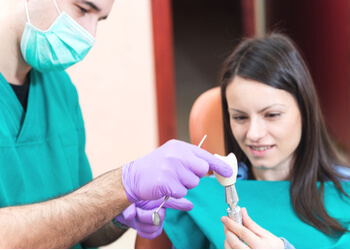Why Dental Implants In The First Place?
Dental implants are metal posts or screws that are typically surgically embedded into your jaw in a traditional procedure.
A permanent tooth replacement
Implants provide a permanent tooth replacement that is currently the closest that we have to natural teeth. They look like and function like the rest of your natural teeth, and can withstand the same biting and chewing force you would exert with your natural teeth.
They are beneficial because they provide a tooth replacement at the roots, unlike dentures and bridges, which only provide a replacement above the gum. Unlike bridgework, dentures do not compromise or weaken the teeth surrounding the site of your implant.
A natural tooth replacement
They are also easier to adapt to than dentures and bridges, and most patients find that they do not affect their speech or ability to eat with comfort like other tooth replacements.
Eat and sleep with implants
They do not need to be removed before eating or sleeping, and require the same amount of dental care and hygiene as the rest of your teeth, without the need for special cleaning.
In order to qualify for implants you do need to have thick enough jaw bone or be a candidate for a bone graft, to ensure your implant has enough bone to integrate with, and enough support to anchor into.
By providing the replacement at the root, dental implants also ensure that further bone loss does not take place in your jaw.

How Do Digital Dental Implants Improve On This?
The traditional implant procedure has a success rate of between 95 and 98%, which is pretty impressive. Digital implants offer all the benefits of traditional implants, and some more.
While there are a number of digital implant technologies available, at DDSS and DDII we make use of the DIO-navi dental implant system to provide high quality restorations for our patients. This minimally invasive system makes use of state-of-the-art technology for greater accuracy, speed and patient comfort.
An accurate procedure
During a traditional procedure the margin for error is always present because it relies on your practitioner’s hand–eye coordination to avoid nerves, soft tissue and surrounding teeth. His expertise is also very important when placing implants in the upper jaw, to ensure that your sinus cavity is avoided. Digital guidance can make this process much smoother for both of you.
DIO digital implants utilise a guided system that assists the dental practitioner in placing the implant in the most accurate position, avoiding nerves, blood vessels and surrounding teeth.
A faster procedure
Thanks to the assistance of digital implant technology your planning and treatment sessions are much faster than they would be using the traditional method. In some cases this means the implant can be placed in less than 20 minutes, and the abutment and crown can be loaded immediately. Yu can also look forward to fewer visits to your dental practitioner.
It is possible to create your prosthesis in just one day, thanks to the assistance of computer-guided milling technology. Some patients just do not have all the time in the world to wait for their implants and need the benefits to be available immediately.
This is in stark opposition to a traditional procedure, which could take months to complete fully. After the placement of the implant your jaw would need a few months to heal from the surgery before your dentist would be able to place your abutment.
Minimally invasive surgery
Due to the nature of surgery being performed, the risk of infection is relevant in traditional implant procedure. With surgery there is swelling, bleeding and bruising and the potential for infection to develop.
Digital dental implants are placed using a keyhole approach. Holes are punched into the site and the implant is screwed into them. There is no incision and they do not need to be stitched up afterwards, and make sure the implant is accessible to your dentist after the procedure.
A safer procedure
Mitigating the risk of infection is significant, because even though infections are rare, they are statistically significant and may still occur.
In some procedures the surgical site might need to be opened up two or three times over the course of a year or 18 months, and each time the patient’s risk of infection is elevated.
A speedier recovery
Because there is no surgery and stitching, most patients recover faster from digital implants. Again, because there is no surgical site being reopened, overall recovery time is significantly less.
Patients who were previously ineligible may qualify for implants
Under the traditional implant procedure, patients who have diabetes, high blood pressure or tissue or organ disease would be ineligible for surgery. Because of the lower risks associated with digital dental implants, these patients may benefit from a permanent tooth replacement solution. This gives a much broader range of people the opportunity to benefit from dental implants.
How Does The Digital Dental Implant Procedure Work?
You will have a comprehensive dental assessment during which your dentist will scan your mouth to create an impression of your oral cavity. This is a much more comfortable approach than the traditional manual process of taking a mould.
Digital implant technology makes it much quicker and much more accurate.

Your DIO digital implants are created in the dental lab, using a computer aided milling process, assuring you of a high degree of accuracy. It also means that your new teeth can be ready much faster than if manual moulding was used.
Next your dentist will prepare your mouth for surgery, which may involve extracting your damaged tooth and cleaning any decay.
Using digital guidance from DIO navi he or she will punch the holes into the optimal position for your implants, before screwing the artificial roots into place. Depending on the condition of your mouth, he or she may also be able to place your abutment at the same time. Some patients may need to return for a second visit.
Once this is done you can go back to life as you know it, without a three month recovery period to adjust to. Typically patients who have a surgical implant procedure will experience some bleeding, inflammation and discomfort at the site of the implant for up to 10 days after the surgery. With a digital implant, this can be avoided.
At Digital Dental Surgery Sydney and the Digital Dental Implant Institute we’re invested in technologies that deliver better results to our patients in a shorter period of time. To find out more about how you can benefit from digital dental implants please contact our practice today to speak to a professional.
Sydney CBD (02) 8294 5812
Gosford (02) 8294 8656






